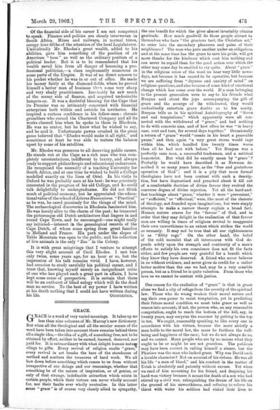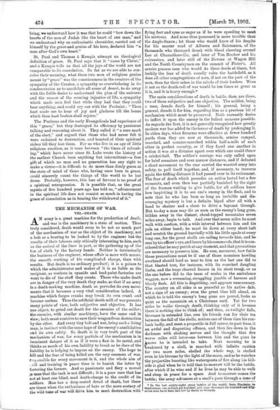GRACE. the one benefit for which the giver almost invariably
obtains gratitude: How much goodwill do those people attract to themselves who have " the gracious tact, the Christian art," to enter into the secondary pleasures and pains of their neighbours ? The man who puts another under an obligation, and at the same time has the grace to save his pride, will get more thanks for the kindness 'which cost him nothing and can never be repaid than for the good action over which the other may some day be enabled to cry quits. About " grace " in the religious sense of the word we hear very little nowa- days, not because it has ceased to be operative;but because we are suffering from " dryness and anxiety of mind " on religious questions, and also because of some kind of emotional change which has come over the world. If a man belonging to the present generation were to say to his friends what Bunyan said about the joys accompanying the gift of grace and the scourge of its withdrawal, they would undoubtedly entertain grave doubts as to his sanity. Bunyan tells us in his spiritual Autobiography of " fierce and sad temptations," which apparently were all con- nected with the withdrawal of " grace," and had nothing to do with concrete sins, and of how often he was " in heavy case, rent and tore, for several days together." Occasionally a return of "grace" would "create in his heart a peaceable pause," and then again "a very great storm would rage within him, which handled him twenty times worse than all he had met with before." Yet Bunyan was a perfectly sane man, a successful tradesman, and a satirical humourist. But what did he exactly mean by " grace " Probably he would have described it as Newman de- scribed it so many years later, as the "free and gratuitous operation of God"; and it is a pity that more formal theologians have not been content with such a descrip. tion, but have dogmatised and preached about it till out of a comfortable doctrine of divine favour they evolved the converse dogma of divine rejection. Yet all the hard-and- fast teachings about " grace," whether it were " prevenient," or " sufficient," or " effectual," were, like most of the rhetoric of theology, not founded upon imaginations, but were simply attempts to make a narrow theory explain a broad fact. Human nature craves for the " favour " of God, and in order that they may delight in the realisation of that favour men are willing in times of religious revival to exaggerate their own unworthiness to an extent which strikes the world as unmanly. It may not be true that all our righteousness is as "filthy rags." On the other hand, the belief of the cold moralist that all intercourse with God de- pends solely upon the strength and continuity of a man's efforts to satisfy his own conscience does not fit the facts either, and few people are very grateful for a benefit which they know they have deserved. A friend who never believes in us without evidence, and never gives us credit for a rather better motive than the one we had, may be a very sensible person, but as a friend he is quite valueless. From those who love us we cannot be content with justice.
One reason for the exaltation of "grace" is that in grace alone we find a city of refuge from the severity of the spiritual law. Those who do wrong weaken their moral nature and sap their own power to resist temptation, yet in predicting their future moral condition we must take grace as well as reason into account; if not, the person who, on any reasonable computation, ought to reach the bottom of the hill, say, in twenty years, may surprise the reasoner by getting to the top in ten. We ought, reasonably speaking, to like every one in accordance with his virtues, because the more strictly a man holds to the moral law, the more he furthers the well- being and happiness of the race ; but we do not always do so, and we cannot. Many people who are by no means what they ought to be or might be are not graceless. The publicah may have been correct in calling himself a sinner, but the Pharisee was the man who lacked grace. Why was David such a lovable character? Not on account of his virtues. He was all his life "a man of blood," and his conduct in the matter of Uriah is absolutely and patently without excuse. Yet when we read of him mourning for his friend, and despising his hard-won victory because it meant the death of a son who had stirred up a civil war, relinquishing the dream of his life on the ground of his unworthiness, and refusing to relieve his thirst with water his soldiers had risked their lives to
bring, we understand how it was that he could "bow down the hearts of the men of Judah like the heart of one man," and we understand why an enthusiastic chronicler, carried out of himself by the grace and genius of his hero, declared him "a man after God's own heart."
St. Paul and Thomas g Kempis attempt no theological definition of grace. St. Paul says that it " came by Christ," and a Kempis tells us that all the joys of the world are not comparable to its consolation. So far as we are able to con- ceive their meaning, what these two men of religious genius meant by "grace" was the consciousness in the creature of the sympathy of the Creator, a sympathy so overwhelming in its condescension as to annihilate all sense of desert, to do away with the futile desire to understand the plan of the universe and the reason of the seeming injustice of life, a sympathy which made men feel that while they had that they could bear anything, and could cry out with the Psalmist : " Thou hest made me to hear of joy and gladness till the bones which thou halt broken shall rejoice."
The Puritans and the early Evangelicals had experience of this " grace," but they destroyed its efficiency by persistent talking and reasoning about it. They called it "a sure mark of the elect," and argued that those who had never felt it were ordained to destruction, and boasted of their spiritual riches till they lost them. For us who live in an age of little religious emotion, as it were between "the times of refresh- ing," which have never since St. Luke wrote the history of the earliest Church been anything but intermittent—a free gift of which no man and no generation has any right to make a virtue—it is difficult to do more than dimly guess at the state of mind of those who, having once been in grace, could sincerely count the things of this world to be but dross. Probably, however, this loss of fervour is no proof of a spiritual retrogression. It is possible that, as the great mystic of five hundred years ago has told us, " advancement in the spiritual life does not consist so much in having the grace of consolation as in bearing the withdrawal of it."







































 Previous page
Previous page